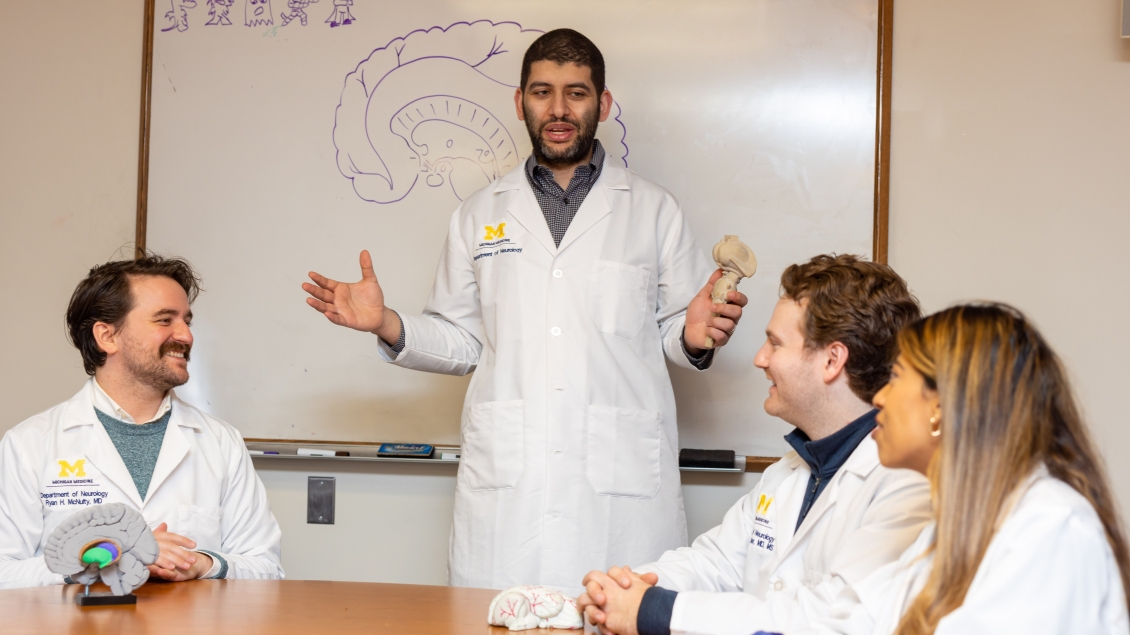
We take pride in the successes that our residents have had, not only as clinicians and researchers, but as educators themselves.
For the last twenty years, University of Michigan Medical School Department of Neurology residents have won a disproportionately large percentage of the teaching awards given out by the University of Michigan Medical School students. We encourage residents to develop their teaching skills by participating in programs designed specifically for this purpose.
Jump to the sections below to learn more about educational opportunities in the U-M Medical School Department of Neurology:
We encourage residents to develop their teaching skills by participating in programs designed specifically for this purpose, such as the Community of Medical Educators in Training (CoMet). This is a trainee-designed, GME-sponsored initiative in which residents meet twice monthly to develop practical teaching skills and implement a medical education-focused scholarly project, facilitated by some of the health system’s most gifted educators.
The Healthcare Administration Scholars Program prepares residents for a career in hospital or medical administration.
The Hope Clinic is a free clinic in nearby Ypsilanti, Michigan. Specialty neurology clinics twice a month are staffed by Michigan Medicine faculty and resident volunteers.
The Michigan Medicine Healthcare Equity and Quality Scholar’s Program (HEQSP) is a 14 month-long certificate program to address cultural humility and social determinants of health. The program provides foundational instruction on quality improvement and supports trainees in a project design to measure and eliminate healthcare disparities in their clinical domain.
The House Officer Quality and Safety Council (HOQSC) meets twice a month to broaden the House Officer’s understanding of and engagement in Michigan Medicine efforts to improve patient safety, health care quality, and transitions in care.
The University of Michigan Medical School Department of Neurology maintains an active schedule of teaching conferences for residents.
Grand Rounds is a weekly conference for the entire department focusing on a clinical or basic neuroscience topic. Speakers include both our own faculty and world-renowned visiting professors.
Each week one faculty member or senior resident is responsible for bringing a live patient to this conference. The presenter elicits the history and demonstrates the key examination findings. Subtle features of the neurologic examination, typical and rare presentations of common or uncommon neurologic disease, and issues of management are all considered. Residents are taught to formulate the problem by localizing the site of the disease, constructing a differential diagnosis, considering appropriate diagnostic tests, and proposing management.
Every Friday over lunch, residents present cases to each other while Dr. Zach London and/or Dr. Doug Gelb lead the discussion about the localization and differential diagnosis. You don’t want to miss this conference because, as we say, this lesion isn’t going to localize itself!
We have a full schedule of regular conferences designed specifically with the educational interests of residents in mind. These include our basic and clinical neurology conference, mindfulness/wellness conference, stroke conference, epilepsy conference, journal club, neuroradiology conference, quality improvement conference, neurogenetics conference, and neuro-ophthalmology rounds. In addition to these conferences, which are specifically designed for residents, several subspecialties hold conferences that residents are encouraged to attend.
Every resident gets educational discretionary money to use on books, educational materials, and travel to conferences. The distribution of these funds depends on meeting administrative metrics, but residents are entitled to up to $1,250 their PGY2 year, and $750 in each of their PGY3 and PGY4 years.
All residents are required to attend or present at a national meeting at least once during their residency, and additional departmental funds are provided for residents who present at meetings. In addition, scholarships are available for many residents to attend the state and national meetings free of cost or at reduced rates.